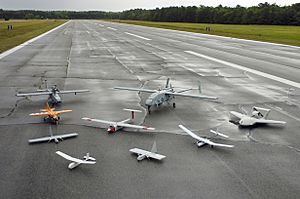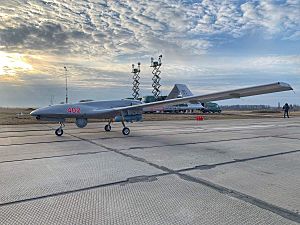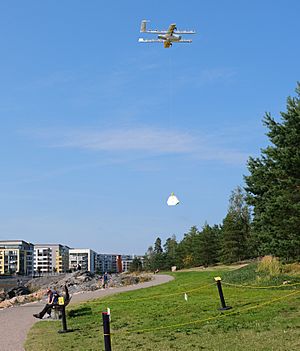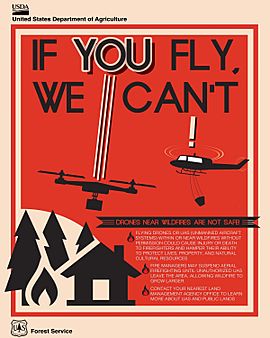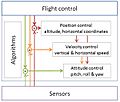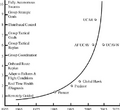Unmanned aerial vehicle facts for kids
An unmanned aerial vehicle (often called a drone) is an aircraft that is not operated by a pilot on board.
Drones may have an onboard computer to take care of adjustments to wind and changes in air pressure. Sometimes they are programmed to a particular target. Important decisions are usually supervised by people on the ground communicating by radio.
Large UAVs are mostly used by military forces, for example for reconnaissance. Some of them are programmed to be a target, to be shot at. A few carry weapons for unmanned combat. Drones also have civilian uses, such as firefighting or taking photographs.
Drones come in different sizes. Wingspans range from a few centimetres to about 60 metres (200 ft), the size of regular, manned aircraft.
Contents
Applications
There are numerous civilian, commercial, military, and aerospace applications for UAVs. These include:
- General
- Recreation, Disaster relief, archeology, conservation of biodiversity and habitat, law enforcement, crime, and terrorism.
- Commercial
- Aerial surveillance, filmmaking, journalism, scientific research, surveying, cargo transport, mining, manufacturing, Forestry, solar farming, thermal energy, ports and agriculture.
Warfare
As of 2020, seventeen countries have armed UAVs, and more than 100 countries use UAVs in a military capacity.
Of the 18 countries that are known to have received military drones between 2010 and 2019. Drones offer potential for covert surveillance and makes them difficult targets to bring down.
UAVs are used for reconnaissance, attack, demining, and target practice.
Civil
Aerial photography
Drones are ideally suited to capturing aerial shots in photography and cinematography, and are widely used for this purpose. Drones provide access to dangerous, remote or otherwise inaccessible sites.
Environmental Monitoring
UASs or UAVs offer the great advantage for environmental monitoring to generate a new generation of survey at very-high or ultra-high resolution both in space and time. Most common applications are:
- Topographic surveys;
- Monitoring of natural ecosystems;
- Precision Agriculture which exploits all available technologies in order to produce more with less (e.g., optimisation of fertilizers, pesticides, irrigation);
- River monitoring.
These activities can be carried out with different approaches that include: photogrammetry, SfM, thermography, multispectral images, 3D field scanning, NDVI maps, etc.
Agriculture, forestry and environmental studies
Agricultural drones have been used to help build sustainable agriculture all over the world. They may help to precisely distribute nutrients or pesticides over a field.
They also help detect and fight wildfires. UAVs are also now widely used to survey wildlife such as nesting seabirds, seals and even wombat burrows.
Law enforcement
Police can use drones for applications such as search and rescue and traffic monitoring.
Safety and security
Threats
Nuisance
UAVs can threaten airspace security in numerous ways, including unintentional collisions or other interference with other aircraft, deliberate attacks or by distracting pilots or flight controllers. The first incident of a drone-airplane collision occurred in mid-October 2017 in Quebec City, Canada. The first recorded instance of a drone collision with a hot air balloon occurred on 10 August 2018 in Driggs, Idaho, United States; although there was no significant damage to the balloon nor any injuries to its 3 occupants, the balloon pilot reported the incident to the National Transportation Safety Board, stating that "I hope this incident helps create a conversation of respect for nature, the airspace, and rules and regulations". Unauthorized UAV flights into or near major airports have prompted extended shutdowns of commercial flights.
Drones caused significant disruption at Gatwick Airport during December 2018, needing the deployment of the British Army.
In the United States, flying close to a wildfire is punishable by a maximum $25,000 fine. Nonetheless, in 2014 and 2015, firefighting air support in California was hindered on several occasions, including at the Lake Fire and the North Fire. In response, California legislators introduced a bill that would allow firefighters to disable UAVs which invaded restricted airspace. The FAA later required registration of most UAVs.
Security vulnerabilities
By 2017, drones were being used to drop contraband into prisons.
Aggression
UAVs could be loaded with dangerous payloads, and crashed into vulnerable targets.
Countermeasures
Counter unmanned air system
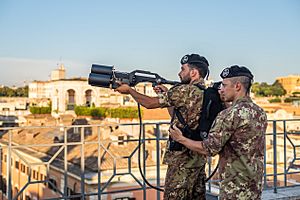
The malicious use of UAVs has led to the development of counter unmanned air system (C-UAS) technologies. Automatic tracking and detection of UAVs from commercial cameras have become accurate thanks to the development of deep learning based machine learning algorithms. It is also possible to automatically identify UAVs across different cameras with different view points and hardware specification with re-identification methods. Once a UAV is detected, it can be countered with kinetic force (missiles, projectiles or another UAV) or by non-kinetic force (laser, microwaves, communications jamming).
Regulation
Regulatory bodies around the world are developing unmanned aircraft system traffic management solutions to better integrate UAVs into airspace.
Images for kids
-
Winston Churchill and others waiting to watch the launch of a de Havilland Queen Bee target drone, 6 June 1941
-
Although most military UAVs are fixed-wing aircraft, rotorcraft designs (i.e., RUAVs) such as this MQ-8B Fire Scout are also used.
See also
 In Spanish: Vehículo aéreo no tripulado para niños
In Spanish: Vehículo aéreo no tripulado para niños


